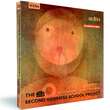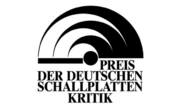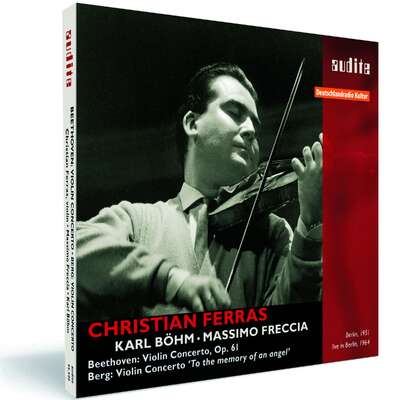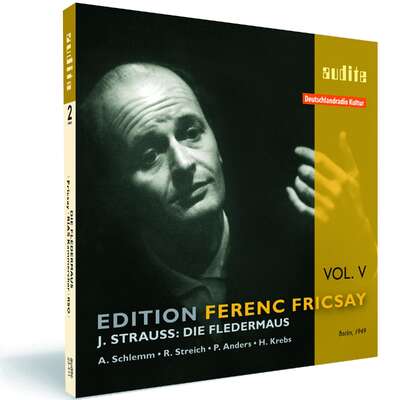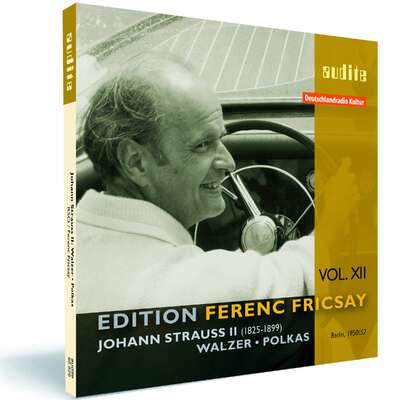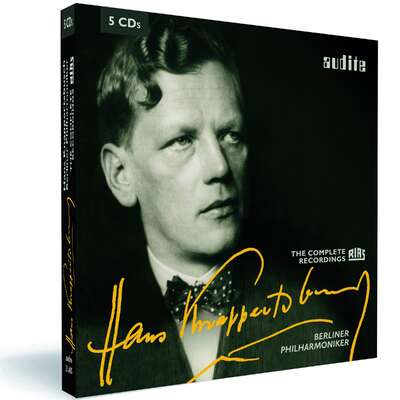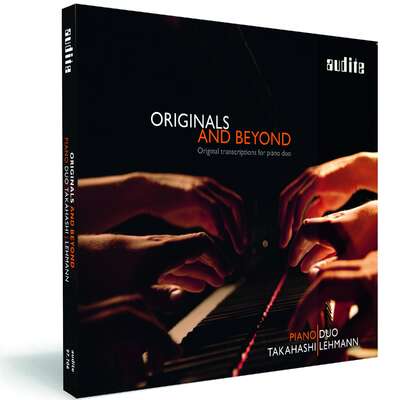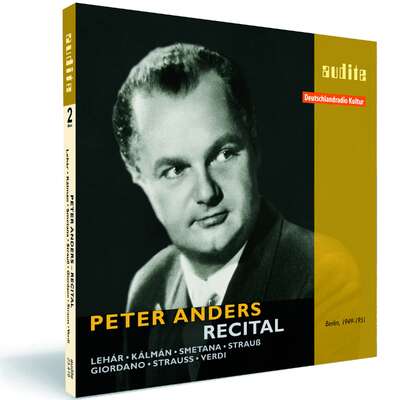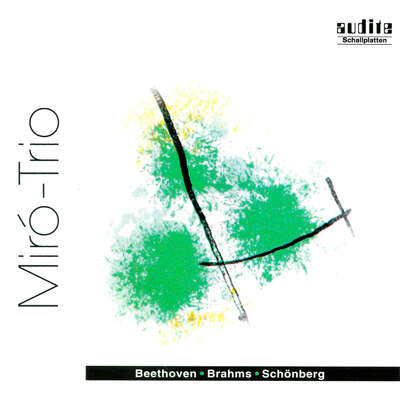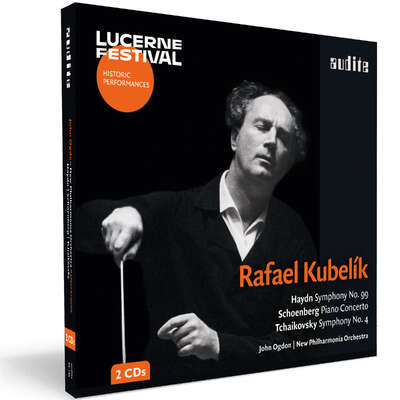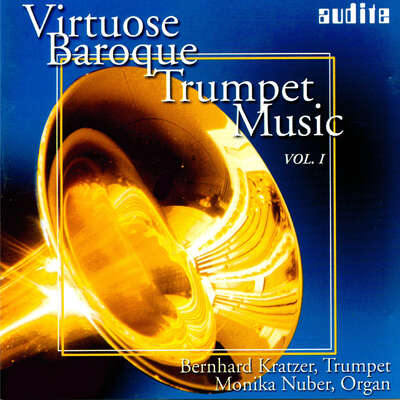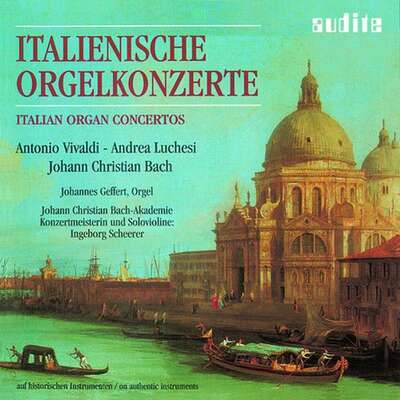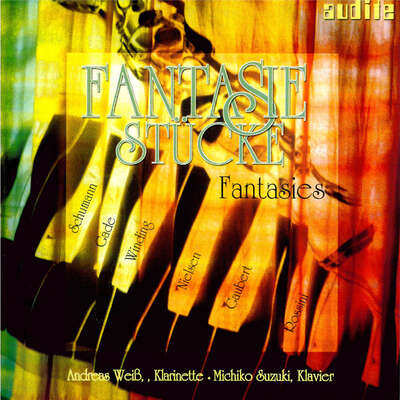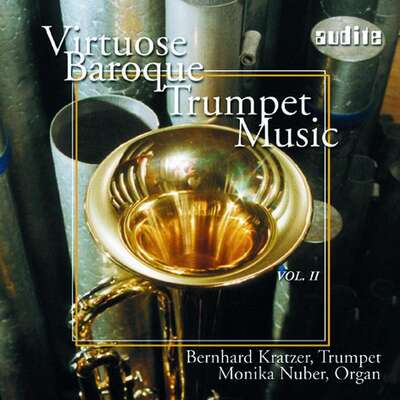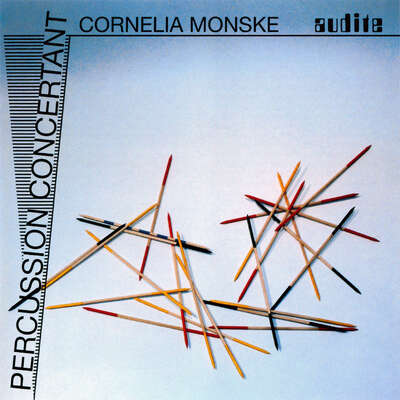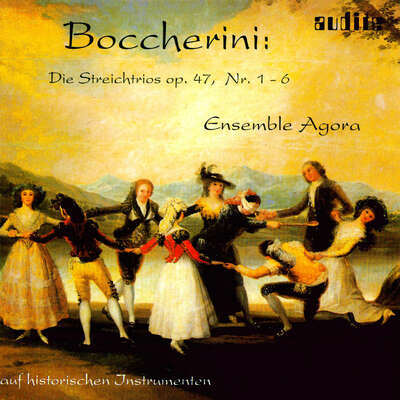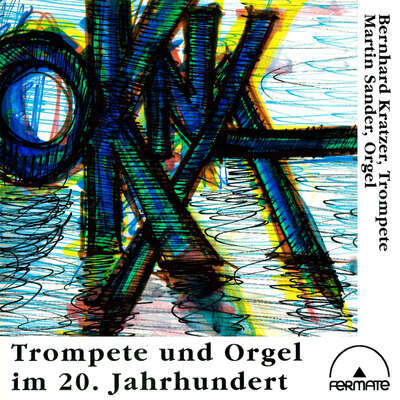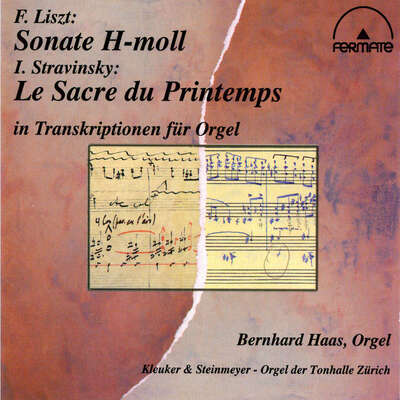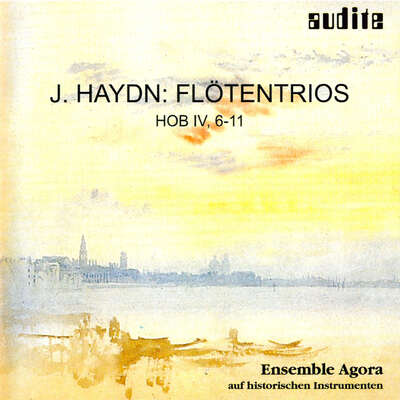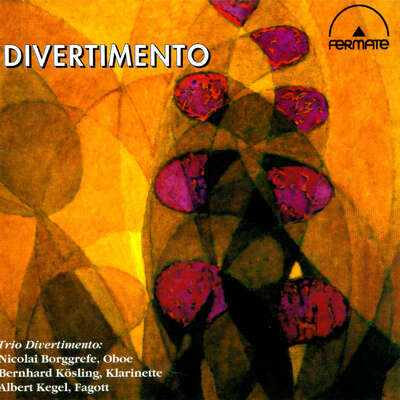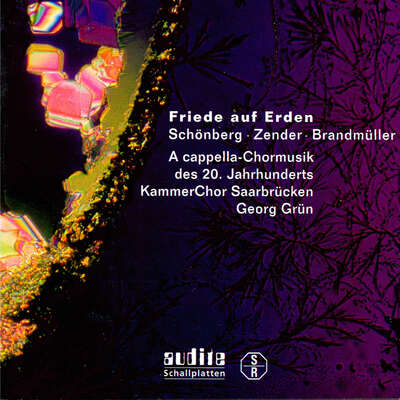
These recordings of central works of the Viennese School, made between 1949 and 1965, are unique musical and historic documents. The first-rate interpreters predominantly come from the immediate circle around the composers, either as pupils of Schoenberg’s or as acquaintances of the composers. With this degree of authenticity and thanks to manifold interpretational approaches, this anthology offers comprehensive first-hand insights into the Second Viennese School.more
RIAS-Symphonie-Orchester | Végh-Quartett | Bastiaan-Quartett | Berliner Philharmoniker | RIAS Kammerchor
Josef Rufer | Ferenc Fricsay | Winfried Zillig | Günther Arndt | Arthur Rother | Bruno Maderna
"Aufnahmen [...], die näher ans Ideal der Komponisten reichen dürften als all jene, die später kamen. Nicht nur bringen Sie den Hörer zurück ins Wien der 20er Jahre – sie räumen außerdem mit einem jahrzehntealten Missverständnis auf." (WDR 3)
Track List
Details
| The RIAS Second Viennese School Project | |
| article number: | 21.412 |
|---|---|
| EAN barcode: | 4022143214126 |
| price group: | BCT |
| release date: | 5. October 2012 |
| total time: | 299 min. |
Bonus Material
-
Producer's Comment
First-hand impressions of producer Ludger Böckenhoff [German]
-
Concert programme_Pierrot Lunaire (March 1949, Berlin)
Teilnachlass Josef Rufer (SIMPK_SM59)
- Berlin Concert Guide - March 1949
- Top list "German Record Critics' Award_1-2013
Informationen
Second Viennese School First-Hand
This 4-CD boxed set presents historic recordings of works by Arnold Schoenberg, the founding father of twentieth-century modern music, and his most prominent pupils, Alban Berg and Anton Webern. These recordings, made between 1949 and 1965, comprise works which were written between 1906 and 1950, thus portraying practically the entire era of the Viennese School. Not only do they trace the multi-layered compositional developments of the Viennese School, but they are also significant musical and historic documents of multi-faceted interpretational approaches towards this music.The Viennese School was formed before the First World War as a movement in music attempting to unite radical expressive techniques and traditional form concepts, demanding specially trained interpreters for this undertaking. In these RIAS recordings, first-rate artists from the circle of the three Viennese composers can be heard: Rudolf Kolisch, Eduard Steuermann, Winfried Zillig and Else C. Kraus were immediately shaped by their teacher, Schoenberg, whereas others, such as Peter Stadlen and TiborVarga were in contact with the composer, or with Webern or Berg. Ferenc Fricsay or Suzanne Danco, on the other hand, did not belong to the circle of the Viennese School and its performance teachings. Their interpretations are of particular interest as they brought these works to life, unprejudiced by performance traditions of this music which, at that time, was hardly performed. The comparison of the two recordings of Schoenberg's Fantasy for Violin and Piano, Op. 47, with Kolisch and Varga respectively, and the sensational interpretation of Schoenberg's Pierrot Lunaire by the Munich singer Irmen Burmester alongside an outstanding instrumental ensemble under the direction of Josef Rufer (1949) are particular highlights of this anthology.
These radio recordings were made possible thanks to the indefatigable initiative of the music writer Hans Heinz Stuckenschmidt in his role as Editor of New Music at the RIAS. He and his colleague Josef Rufer, who can be heard as conductor, ensured that those musicians who had returned from exile would be engaged to contribute to these radio documents. By doing so, Stuckenschmidt and Rufer intended, on the one hand, to continue the tradition of Schoenberg's stay in Berlin from 1925 until1933, and, on the other hand, to provide the music of the Viennese School with greater resonance within public awareness.This edition is complemented by the publication of a text by Prof Dr Rudolf Stephan, the doyen of research into the Viennese School in Germany after the Second World War and editor of the complete works of Arnold Schoenberg and Alban Berg. He reflects on his comprehensive experiences with the music of theViennese School, stretching back to the years immediately following the end of the war.
Reviews
www.opusklassiek.nl | mei 2021 | Maarten Brandt | May 1, 2021 | source: https://www.opus...
Audite heeft alles in het werk gesteld om de opnamen zoveel mogelijk in hun oorspronkelijke staat te laten [...] Maar voor de overgrote meerderheid komt alles haarscherp duidelijk en met een opperste aan transparantie uit de luidsprekers en wordt ook nog eens onderstreept dat sommige mono-opnamen het winnen van nogal wat gladgepolijste en gekunstelde digitale remasterings. Overbodig te zeggen dat het verantwoordelijke technische team daarvoor het grootst denkbare compliment verdient.Mehr lesen
klassik.com
| 25.08.2013 | Frank Fechter | August 25, 2013 | source: http://magazin.k...
Archiv der Zweiten Wiener Schule
The Rias Second Viennese School Project – Werke von Schönberg, Berg & Webern
Diese sensationelle, mustergültige Edition mit RIAS-Aufnahmen derMehr lesen
www.opusklassiek.nl | augustus 2013 | Emanuel Overbeeke | August 1, 2013 De Tweede Weense School: de complete RIAS-opnamen 1949 ~ 1965
Aanvankelijk is alles overzichtelijk. Wie zich wil verdiepen in eenMehr lesen
www.amazon.de | 2. April 2013 | Luciano Bosotti | April 2, 2013 | source: https://www.amaz... When this was really avant-garde
While much of this music is now, at least to some extent, part of the standard repertoire, these pioneer recordings retain a unique flavour ofMehr lesen
As in most previous RIAS (re)issues the quality of recordings ranges from more than acceptable to good.
Highly recommended to anyone interested in music of the first half of the XX century.
Scherzo | Año XXVIII - Nº 284 - Abril 2013 | Enrique Martínez Miura | April 1, 2013
Audite
Jirones de historia
La importancia histórica de estas grabaciones salta a la vista, pues aquíMehr lesen
Musica | N° 245 - Aprile 2013 | Piero Rattalino | April 1, 2013
Il titolo che spicca sulla copertina del box è «Second Viennese SchoolMehr lesen
www.opusklassiek.nl | maart 20123 | Aart van der Wal | March 1, 2013
Het meest fascinerende aspect van deze prachtuitgave is dat we niet alleenMehr lesen
Preis der Deutschen Schallplattenkritik
| 1/2013 | Wilhelm Sinkovicz | February 15, 2013
PdSK Bestenliste 1-2013
Historische Aufnahmen Klassik
Bis heute gilt die Musik der sogenannten zweiten Wiener Schule rund um Arnold Schönberg als schwierig. Dass der Zugang nicht schwerfallen muss, habenMehr lesen
Gramophone | February 2013 | Rob Cowan | February 1, 2013
Pushing the boundaries
Two valuable collections of trailblazing European modernism
The claim that a particular performance carries historical weight doesn't necessarily guarantee its interpretative significance. However, Audite'sMehr lesen
Among the more unexpected treasures are performances of Schoenberg's First Chamber Symphony and, especially memorable, three movements from the Suite in the Old Style, both under Ferenc Fricsay, while Suzanne Danco haunts the 15 songs that make up The Book of the Hanging Gardens with musical intelligence and a clear, expressive tone that emerges as less shrill than on other commercial recordings.
Eduard Steuermann (a Humperdinck and Schoenberg pupil) offers supremely natural renditions of the Piano Pieces Opp 11, 19 and 23 – he could as well have been playing Brahms – and among the chamber performances featured are Berg's Lyric Suite, where the Vegh Quartet focus the score's every shifting shade, and a performance of Schoenberg's String Trio by Erich Röhn, Ernst Doberitz and Arthur Troester that sounds as if the players are staking their very lives on maximum communication. Two very different performances of Schoenberg's Phantasy for violin and piano find Tibor Varga sporting a fast vibrato in 1951, with Ernst Krenek a considerate duo partner, and a more cerebral Rudolf Kolisch partnered by Alan Willman in 1953.
As to Webern, Arthur Rother builds a delicately voiced but powerful account of the Passacaglia (1965) and from four years earlier Bruno Maderna attends to the Op 10 pieces with something resembling a watchmaker's care over detail. Both performances feature the Berlin Radio Symphony. Other items are performed by the soprano Evelyn Lear, Magda László (in Berg's Seven Early Songs), the husband-and-wife team of violinist Andre Gertler and pianist Diane Anderson, the clarinettist Heinrich Geuser, the Bastiaan Quartet and the RIAS Chamber Choir. The mono broadcast recordings have been very smoothly transferred, there's an excellent booklet and I would call this set both historically important and musically rewarding. […]
Frankfurter Allgemeine Zeitung | Freitag, 4. Januar 2013 | Christiane Tewinkel | January 4, 2013
Nur eine mopsfidele junge Schachtel zu viel
Arnold Schönberg und seine Schüler in raren historischen Aufnahmen – und dazu ein famoses Liedprojekt
Es nimmt nicht wunder, dass das „Buch der hängenden Gärten“ auch in einem anderen umfangreichen Album eine zentrale Position einnimmt, nämlich der hervorragend dokumentierten Neuauflage von historischen Aufnahmen aus den Jahren 1949 bis 1965, dem „Second Viennese School Project“ mit Werken von Arnold Schönberg, Alban Berg und Anton Webern, mit Interpreten aus deren engerem und weiterem Umfeld.Mehr lesen
Pizzicato | N° 229 - 1/2013 | Steff | January 1, 2013 Aus der RIAS-Schatzkammer
Audite veröffentlicht eine Vierer-Box mit den Aufnahmen der Zweiten Wiener Schule zwischen 1949 und 1965. Es ist natürlich unmöglich, an dieserMehr lesen
Eine weitere Box ist dem ukrainischen Violinisten Bronislav Gimpel gewidmet. Gimpel war ein Vollblutmusiker, dessen Interpretationen der russischen Tradition verbunden sind. Wenn sie heute auch ein bisschen altmodisch und überzeichnet erscheinen, so kann sich doch niemand ihrer Kraft widersetzen. Ich muss sagen, dass ich das Sibelius-Konzert in keiner anderen Aufnahme so düster und dramatisch erlebt habe, wie mit Gimpel, dem RIAS-Orchester und Fritz Lehmann am Pult. Diese durch und durch romantische Wiedegabe besitzt eine Tiefe und Ausdruckstärke, die einfach atemberaubend sind. Wie dieses Sibelius Konzert muss man auch das 2. Violinkonzert von Karol Szymanowski als eine absolute Referenzeinspielung ansehen. Erstaunlich, zu welcher Homogenität der aus dem Vollen schöpfende Violinist und der nicht minder engagierte Dirigent Arthur Rother finden. Die übrigen Werke besitzen nicht ganz dieselbe Unmittelbarkeit. Zwar glänzt Gimpel auch in Wieniawski-Konzert, doch Alfred Gohlke bleibt als Dirigent bescheiden, ebenso die Leistung des Orchesters. Die Violinsonaten von Schubert, Mendelssohn-Bartholdy, Schumann, Janacek und Tartini sind sehr speziell, doch zeugen sie von der großen Musikalität Gimpels. Heute würde man diese Kammermusik kaum noch so spielen, aber für den Musikinteressierten sind es unschätzbare Zeitdokumente. Martin Krauses Klavierspiel ist bestenfalls begleitend, dieser Pianist besitzt nicht das künstlerische Rüstzeug, um einem genialen Violinisten wie Bronislav Gimpel ein wirklicher Partner zu sein.
ClicMag | janvier 2013 | NMN | January 1, 2013
Tous les enregistrements présents sur cette compilation des troisMehr lesen
Audiophile Audition | December 31, 2012 | Gary Lemco | December 31, 2012
As it becomes apparent, perhaps painfully, that most of the musicMehr lesen
The Guardian | Wednesday 5 December 2012 | Andrew Clements | December 5, 2012
This fascinating anthology brings together recordings of works byMehr lesen
Kulimu | 38. Jg. (2012), Heft 3 | alu | December 1, 2012
Das RIAS Neue Wiener Schule Projekt vereinigt auf 4 CDs maßstabsetzendeMehr lesen
WDR 3 | WDR 3 TonArt: Montag, 05.11.2012 | Arnd Richter | November 5, 2012 The RIAS Viennese School Project
Anfang der 20er Jahre des letzten Jahrhunderts, nachdem der WienerMehr lesen
Sunday Times | Sunday, 7th October 2012 | Paul Driver | October 7, 2012
Hard to exaggerate the richness of these four CDs — recordings from theMehr lesen
Die Presse | 04.10.2012 | Wilhelm Sinkovicz | October 4, 2012
Rias Berlin - "The Second Viennese SchoolProject"
Wiener Schule
Es war nicht leicht, nach 1945 die Musik der sogenannten Wiener Schule demMehr lesen
kulturtipp
| 20/12 | Fritz Trümpi | October 1, 2012
Wieder gehört: Zwölf Töne auf Wienerisch
Eine interessante CD-Box erinnert an die Musik der Zweiten Wiener Schule.
Schönberg solle besser Schnee schaufeln als Notenpapier vollkritzeln,Mehr lesen
Diapason | N° 613 Mai 2013 | Patrick Szersnovicz | May 1, 2012 La deuxième école deVienne
«Ma musique n'est pas moderne, elle est mal jouée», disait Schönberg, conscient du manque de professionnalisme de certains de ses interprètes,Mehr lesen
La ferveur domine dans ces lectures d'attrait inégal mais souvent passionnantes, et toujours révélatrices des questions qui se sont d'abord posées pour bien jouer Schönberg et son école. Parfois l'interprétation n'est pas au niveau des intentions: malgré la compétence des chefs (Zillig, Fricsay), les musiciens du RIAS (Concerto pour piano, Symphonie de chambre op. 9) ou les Berliner Philharmoniker (extraits de la Suite pour cordes) ne semblent pas toujours comprendre leur role. Ailleurs, les problèmes d'assimilation instrumentale, technique, voire esthétique sont mieux résolus et ne compromettent en rien la direction puissante et romantique d'Arthur Rother dans la Passacaille de Webern ni celle, inventive, lumineuse, de Maderna dans ses Cinq pièces op. 10. Le Pierrot lunaire avec Josef Rufer à la baguette (1949) pèche par un manque de soin dans la sonorité, les instruments devenant d'une couleur agressive, alors que la récitante Irmen Burmester est remarquable.
Les solistes réunis ad hoc (Doberitz, Röhn, Troester) pour l'essentiel Trio à cordes op. 45, sommet de l'oeuvre de Schönberg, tout comme le Quatuor Vegh dans la Suite lyrique sont saisissants par leur modernisme anguleux, leur intensité dramatique et leur constante prise de risques, qui font oublier quelques imprécisions techniques et une texture d'ensemble peu équilibrée. Enfin, découvrir Suzanne Danco dans le grand recueil du Livre des jardins suspendus, Rudolf Kolisch ou Tibor Varga dans la Fantaisie op. 47, André Gertler et Diane Andersen dans les Pièces op. 7 de Webern ou Eduard Steuermann – qui a fasciné toute une génération de pianistes, à commencer par Alfred Brendel – dans les Klavierstücke op. 11, 19 et 23 vaut largement le détour.
